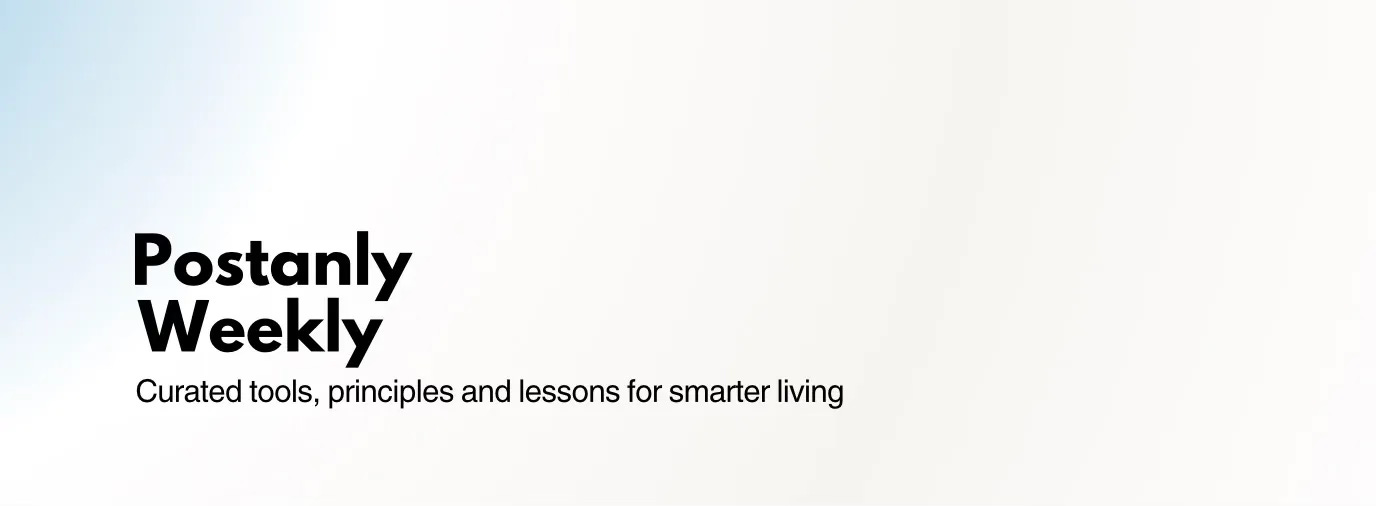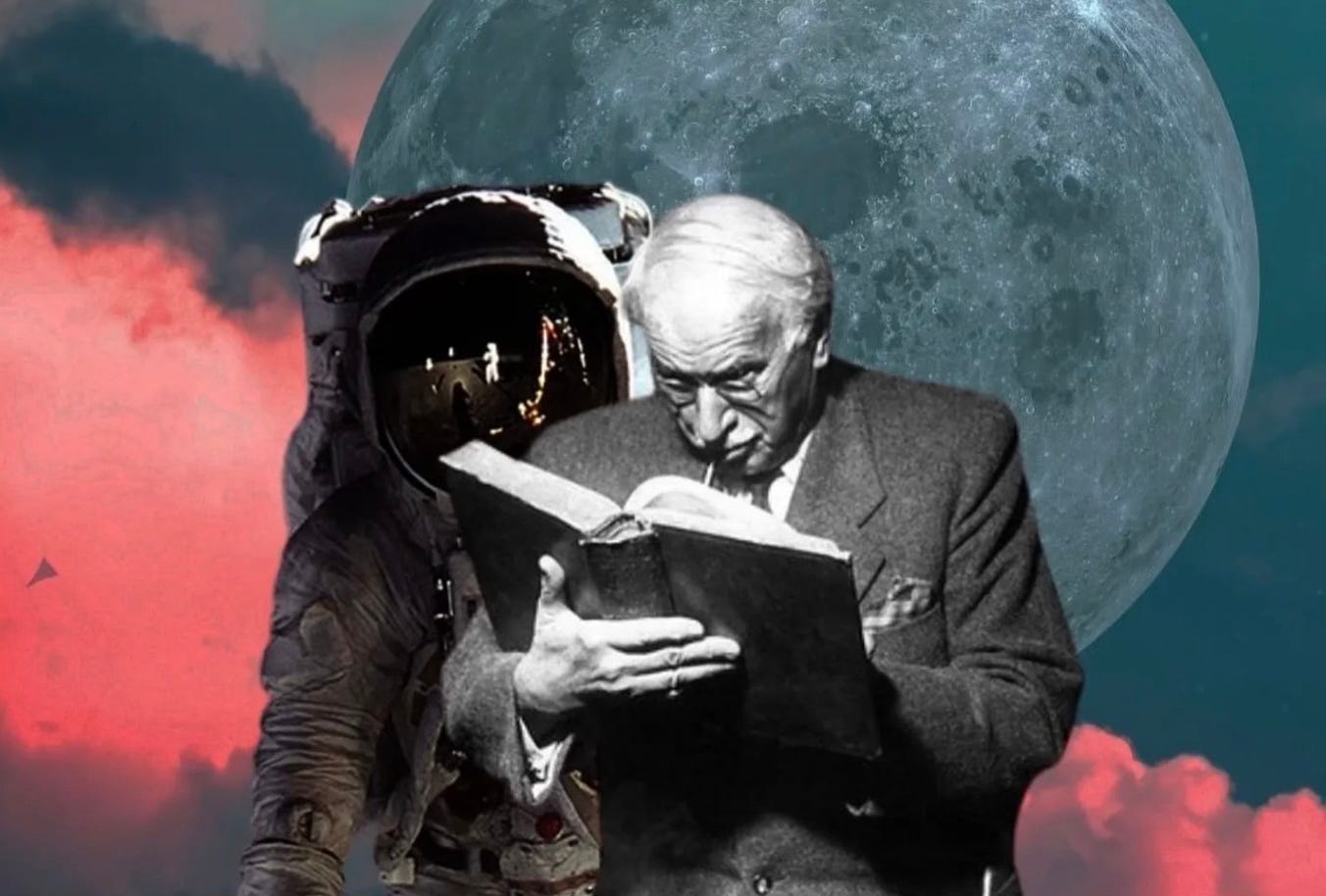Hello everyone,
Postanly Weekly is a reader-supported smarter living newsletter. To support my work, you can upgrade to a paid subscription for $7 per month or $40 for an entire year. With a modest yearly contribution you’re not only helping keep Postanly Weekly going, you also get free access to Thinking Toolbox (mental models for life) and Mental Wealth Toolbox (practical concepts for smarter decisions). 50% off today (get free instant access to Thinking Toolbox (mental models for life) and Mental Wealth Toolbox.
Use this special link or the button below. Expires in less than 30 hours.
You Are Not What Happened to You
In psychology, learned helplessness is a common affliction that we all experience occasionally. It refers to the inability to take control over external events and a tendency to accept one’s fate as inevitable. When something bad happens to us (a failure, rejection, loss), we tend to assume that it is beyond our control and that we are powerless against it.
The thought process usually goes like this:
“What did I do wrong? Why does this keep happening to me?
There must be something about me that makes people not want to be around me or associate with me”. And if we are surrounded by people who constantly reinforce these ideas and make us feel even more miserable about ourselves, then things can spiral out of control quickly, and we may very well develop full-blown depression.
The stories we tell ourselves can do more harm than good.
So many people feel stuck or dissatisfied with their current life because they can’t derail their negative perceptions of themselves.
The people in your life may pull at you and cause some pain, but they can’t hold you back if you don’t let them.
You are not what happened to you; you are what you choose to become.
“The world will ask you who you are, and if you don’t know, the world will tell you.” — Carl Jung
In the words of Carl Gustav Jung, a psychiatrist and psychoanalyst who founded analytical psychology, “I am not what happened to me, I am what I choose to become.” According to Jung, our past experiences, whether good or bad, can influence us in many ways, including shaping our personality, values, and beliefs.
However, he believed that it is not the experiences themselves that define us, but rather our response to them. In other words, we are not defined by what happens to us but by how we choose to respond to those events.
People are shaped by their personal experiences but also possess the power to shape their own lives.
Jung thought people have a unique capacity to overcome their past experiences and transform their lives in meaningful ways. He observed people are not passive victims of circumstances or events, but active agents who can make choices and exercise their free will to create their own futures.
Jung emphasizes the importance of personal agency and the ability to choose your own path in life rather than being defined by past experiences or external circumstances.
We all have the power to transform ourselves by confronting our deepest fears, desires, and conflicts. The courage to face our past or personal struggles can help us gain a greater understanding of ourselves.
“The most terrifying thing is to accept oneself completely. Your visions will become clear only when you can look into your own heart. Who looks outside, dreams; who looks inside, awakes,” argues Carl Jung.
When you view your life as a series of experiences and opportunities rather than as something that happened to you, you are much more likely to find the silver lining in any dark cloud that might be hanging over your head.
You are the sum of the choices you make and the actions you take today. No matter what life throws your way, you have the power to choose how you respond and choose who you want to become.
Your path in life is determined by the decisions you make, the goals you strive for, and the life you create for yourself.
You are in control of the direction your life takes. The choices you make today can shape the person you will be tomorrow.
Get comfortable with your truth
“The privilege of a lifetime is to become who you truly are,” Jung said.
The self-awareness journey requires us to ask ourselves tough questions and to open up to the possibility of change. It asks us to confront our fears and embrace our true self’s beauty. It is a privilege to peel away the layers of our identity and become the person we were born to be.
Navigating the self-discovery process can be daunting; many people never try to know themselves deep enough.
However, there is a tremendous sense of satisfaction that comes from understanding and exploring who you are and what makes you special.
It is a privilege to pursue this journey and gain a greater understanding of yourself and your place in the world. It is a chance to live a life of purpose and clarity and to gain a greater sense of self-awareness.
According to Jung, “people will do anything, no matter how absurd, to avoid facing their own souls.”
He believed that true personal growth requires a willingness to face one’s own shadow and integrate the unconscious aspects of the self into consciousness.
Living your truth requires total acceptance. That means confronting your unconscious mind and the shadow aspects of your personality.
The shadow refers to the aspects of our personality that we repress or deny, such as negative emotions, impulses, and desires.
By acknowledging and integrating these aspects of ourselves, we can achieve greater wholeness and self-awareness. You can develop greater empathy and understanding of others by exploring your own unconscious biases and prejudices.
When you explore your emotions and motivations, you will better understand your reactions to situations and develop greater emotional awareness and regulation.
By turning your attention inward and exploring your own inner world, you can awaken to your unique potential and sense of purpose in life.
Food for thought
Unbecoming Who I’m Not [Free read on Medium]
Looking inward isn’t about finding who you’ll be but remembering who you’ve always been. Letting go of who you think you should be is the first step towards becoming who you truly are.
I’m always questioning what has been passed on. I don’t want to become a stranger to myself. Unbecoming is lifelong. It’s creating space for the unknown.
But I’m ready.
I’m ready to silence the external noise.
A few principles I try to live by
#1. Your present life is a reflection of your past views, habits, attitudes, beliefs, thoughts, fears, worries and perceptions. If you want a different outcome, or a different life, upgrade your perception of life and living it.
#2. True wisdom is understanding the extent of your ignorance. Always assume you don’t completely understand something. It will foster humility and create more opportunities to learn.
“One of the most important lessons I’ve learned as an astronaut: to value the wisdom of humility, as well as the sense of perspective it gives you, ” writes Chris Hadfield, in his book, “An Astronaut’s Guide To Life On Earth”.
#3. Anything that doesn’t move you toward your true north is a detour, a temporary setback — pursuing what makes you come alive is the secret to a happier, longer and healthier life. Everything else is secondary.
#4. In the age of abundance, moderation is key to a satisfying life. Living moderately means choosing your actions wisely. It also means using boundaries to do things that bring you joy. “Be moderate in order to taste the joys of life in abundance.” Epicurus once said.
#5. Never stop learning. Become a life-long learner — your intellectual growth depends on it. Choose to become wiser today than you were yesterday. Isaac Asimov was right, “Self-education is, I firmly believe, the only kind of education there is.”
#6 Don’t be confined by the opinions and expectations of others, no matter how close they are to you. Learn to create your own reality. Your first responsibility is to yourself. “You have no responsibility to live up to what other people think you ought to accomplish. I have no responsibility to be like they expect me to be.” Richard P. Feynman said.
#7 Learn to double down on what’s working and what you enjoy. Don’t make unstructured learning a chore. The art of unstructured learning is an art. Master it, own it, and make it work for you. The joy of figuring things out on your own is a fantastic experience. Nobody ever figures out all of life.
Two more things
1. Meco: A new year, a new inbox
Read all your awesome newsletters on a single app. Your inbox wasn’t built for reading. Meco helps you move your newsletters to a space built for reading and declutter your reading experience in seconds. Get started with the newsletter aggregator built for reading. It’s Free.
2. > My personal growth newsletter recommendations
Check out our favourite picks → Topics covered: productivity, better living, self improvement, mastering skills for life and career growth.
Selected newsletters for life and career growth.
Thanks for reading!
Happy New Year!
Thomas
Medium | All Courses | The Write Life | Philosophy For Modern Life
Postanly Weekly is now a reader-supported publication. To support my work, you can upgrade to a paid subscription for $7 per month or $40 for an entire year. With a modest yearly contribution you’re not only helping keep Postanly Weekly going, you also get free access to Thinking Toolbox (mental models for life) and Mental Wealth Toolbox (practical concepts for smarter decisions).
January discount: 50% off today (get free instant access to Thinking Toolbox (mental models for life) and Mental Wealth Toolbox.
Use this special link or the button below. Expires in less than 30 hours.





Thank you for the powerful reminders.
Fantastic article! I needed this today. Thank you.